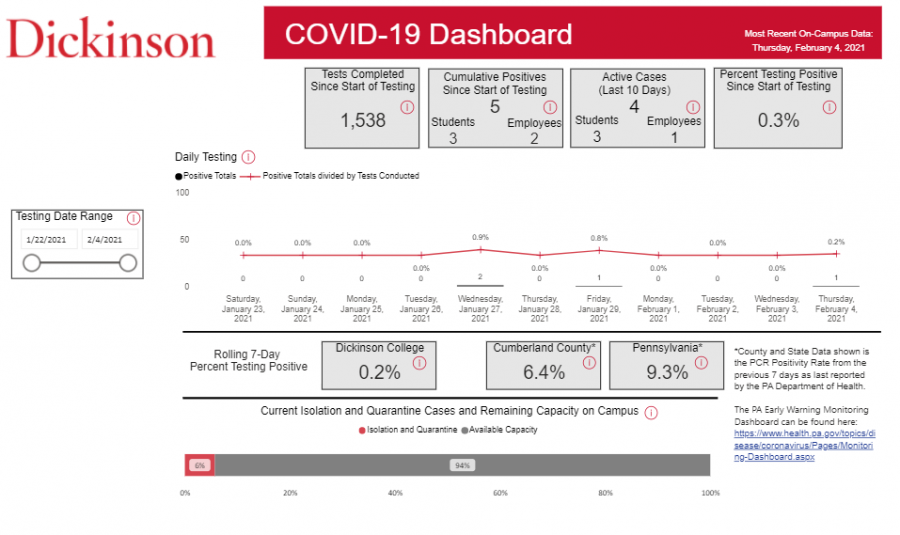College Implements New Measures to Track and Report COVID-19 on Campus
In an effort to prevent the transmission of COVID-19 on campus, Dickinson has created a live dashboard this spring semester to track and report new COVID-19 cases on campus to the Dickinson community. This tracking system is being combined with other protocols, such as the formation of pods and systems for contact tracing, to ensure the health and safety of students and faculty on campus.
“We adapted it from what had been an award-winning COVID dashboard,” said President Margee Ensign when asked about how the college chose to use the dashboard. “It might look simple, but that is actually the sign of a good system. We want people to have all of the information they need to know as to where we stand at this moment, this day.”
According to President Ensign, this dashboard is updated every weekday with information about case numbers on campus, in Cumberland County, and throughout the state of Pennsylvania. It also includes every communication from the college to the community regarding COVID-19 and updates on daily testing numbers and available capacity for quarantining. Ensign hopes the college can continue to expand the amount of information and resources available to students and faculty members through this program.
“Over time, we want to be able to put more vaccination information on there. [Dickinson College] is also leading a vaccine task force for the county, which is trying to identify new sites for local community testing,” Ensign said.
Dickinson College’s COVID-19 dashboard can be found here.
Additional measures are also in place if a student or faculty member tests positive for COVID-19. George Stroud, vice president and dean of student life, spoke with The Dickinsonian about this process, along with the role of Dickinson’s COVID-19 case manager and coordinators.
“When a student tests positive that is here on campus, we have a COVID-19 case manager that was hired down in the Wellness Center,” Stroud said. “That individual will contact the person who has tested positive and contact residence life. We have what are called COVID-19 case coordinators who will help that person, the one who tested positive, transition from wherever their housing is to the quarantine and isolation space. They will be placed there for a minimum of 10 days or until they are no longer symptomatic.”
Along with these measures, Stroud added how COVID-19 case coordinators check in with students in quarantine multiple times a day to ensure that each of their needs are met while in isolation. Contact tracing also occurs following a positive test result, with any close contacts of the infected individual notified and moved into quarantine, including pod members. However, that is not always the case.
“There is a chance that there will be people within a pod who are not deemed close contacts. What we do then is we will put the pod on quarantine in place,” Stroud said. “So they will stay where they are if they were not close contacts, and we will continue to monitor them and see if any of them have become symptomatic. If so, we will obviously move them into quarantine and isolation as well,” hee added.
In an effort to prevent the rise in further case numbers, the college has also implemented new health precautions and protocols throughout campus to ensure the safety of both students and faculty members. These measures include twice weekly testing, mandatory face coverings, maintaining a distance of six feet or more from individuals outside of their pod, and following Pennsylvania’s guidelines for social distancing.
With in-person courses, each class will be spread out to allow for social distancing during class lectures. According to President Ensign, some students may be taking in-person courses from places that are not traditional classrooms on campus to ensure that social distancing can occur. New ventilation systems were also installed in many buildings across campus as well to help further protect students and faculty members.
“We have put in place a structure, a set of policies,” stated President Ensign. “They are not recommendations, they are not guidelines. Students have to follow them. We all want to be here, we all want to be together learning and in a community. We’ve worked really hard to prepare for that. So if we all follow everything that we have set in place, we can get through this.”
“It’s about transparency, which is something we are very dedicated to,” said Connie McNarmara, vice president of marketing and communications. “We know there is a lot of information on the dashboard pages and on the reopening pages, but since some people weren’t reading these we decided to create videos. We are trying to inform people in every way that we can.”
President Ensign emphasized the importance of remembering that you are not only protecting yourself – you are also protecting others.
“Human life is really important, and the health and safety of our community has been our priority from the beginning,” said President Ensign. “Those values have guided all of our decisions and they will continue to. But we can’t all do this in isolation – everybody has to play their part.”






Jack J • Feb 4, 2021 at 10:37 pm
Track it all you want. We are still on campus and not going away. Great to be back in Carlisle.